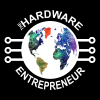In this episode I wanted to give you an overview on an essential topic that can make or break your business - the chosen business model.
My goal now is to give you an overview of two major business models, B2C (Business to Consumers) and B2B (Business to Business) with all its pros and cons. I approach this topic based on my own recent experiences that you will learn about, as well as based on interviewing many entrepreneurs; lastly by relying on some good old logic. I will also make an announcement in this episode which will serve as pillars to this episode on what I have to share about B2B vs B2C.
I think this is an important topic that I wanted to write and talk about for a long time, so please enjoy.
Episode Notes
- An announcement to make, a distinction to clarify and lessons to share - [0:44]
- What do you do when a constellation happens? - [2:11]
- A crash course in b2b and b2c – pros and cons illustrated with examples - [5:14]
- Trends, connections and overlap in Silicon Valley - [10:08]
Books / companies / links mentioned
Contact
- See contact page
Episode Transcript
Hi, this is Balint Horvath, your host. I have some announcement to make, an announcement which I probably should have shared with you but it's not too late yet, I guess. I joined a hardware startup last year. Why did I do that? I’ll talk about that in the first part of this episode. In the second part I'll talk about b2b and b2c. What are these short forms, you may ask. b2b in short means business to business when you sell a product or service to another business and b2c is business to consumer when the customer is the public. Which one is better or worse? Can we make that comparison at all? These questions will be in the second part of the episode together with examples of companies. In the third part of the episode I'll talk about my recent trip to Silicon Valley in February and some of the lessons that I got from there, from this trip. As some of you might know I started this podcast with the goal of helping hardware entrepreneurs via stories shared from other hardware entrepreneurs and also myself to inspire and to educate.
Last year I met a friend of mine who has a similar background as me. Of course, at the time I was doing intensely, I was dealing with the podcast, recording a lot of episodes and I loved it. I still love it. And we discussed with this friend of mine the topic of photonics, the topic I had during my Ph.D. and also during my career afterwards. And he talked about a hardware startup which is active in photonics. We started discussing more and more this topic and it just picked my curiosity, my interest. I was doing at that time some consulting leading projects with Scrum as project management method for a U.S. based company. And when this discussion came up it was like a constellation. When a constellation happens, like a star constellation, then you wonder what it can be. So I stopped and thought about it and I liked several aspects of this, of what the company was doing so that they are busy, they are active in photonics. It's a b2b company producing high tech products and they are about to sell their first product, to bring it onto the market. These are all really interesting incentives for me. As you know high tech means many times that it creates a high barrier of entry. So this way it's harder for copycats to come out. This looked quite advantageous.
And my other rationale for joining was that by actually working at the hardware startup I get to see how it operates on the inside. And these are all valuable lessons that I could share with you guys so I can see how the company works, what the issues are, the challenges. Basically, I have been working with the founders. It’s a small team and it's a great experience like a roller coaster ride, of course, which I actually never liked when I was a kid but maybe when I’m now adult it's different. So I said “Yes” after the discussions. I'm doing sales and marketing there and in the b2b space. I guess I should mention also the company's name. It's called IRsweep. We produce spectrometers, very expensive spectrometers for doing spectroscopy in the IR, in the mid-IR spectral range. So from around 2 microns to around 10 microns in our case, the wavelength being in this range.
So, to step back a bit, there are two business models. Now that I mentioned b2b that IRsweep works with. And the specialty of b2b is that it's more complex than b2c. It is a complex purchasing process with many players, the more simple structure being such that it has three players: a user, an economic and a technical stakeholder. In our case of selling the spectrometer it means a user is a person who is actually using it, like a Ph.D. student or a researcher who is using the spectrometer to do measurements. An economic person is a like a professor but it could also be the purchasing department of a university or even upstream, even the committee awarding grants and deciding which professor can make what kind of investments. Third, technical stakeholder is the professor who is deciding based on his or her technical knowledge if it brings him new benefits. I mentioned that it's a more complex process with many players but it also means that there's a longer decision process and you know these three players can be involved in these steps. So a longer process also means it takes longer to sell. There are such steps as problem recognition when somebody is scratching his head trying to understand a problem which is by the way a great phase to be in when you're trying to sell because you're at the beginning so you can start educating the customers and you can ask relevant questions.
Second is like information gathering, the second step. This is typically when the person evaluating the technology is doing it on their own but it's possible to send some supporting material to the person. Third step is evaluation of options so shortlisting some options based on some criteria they use. And this is also the moment when you can ask about the criteria. Then the fourth evaluation of risks, concerns. This is when you can give client references. And then purchase decision when the paperwork has to be done and the evaluation of purchase when they evaluate if they want to do business with you again. This is like a really super short crash course on the sales process. It's also more analytical than b2c. So you need to show what in this case you might ask. It's a magical word - ROI - Return On Investment. So you need to show that if they spend money on you, on your product when they will get their money back, their investment back.
They're also less price sensitive these players compared to b2c. So that's another big benefit entrepreneurs and investors see in b2b business. In b2c the user is many times also the decision maker who is holding the money in his pocket and also he's the one many times who's knowledgeable to some extent about the technical topics. So when you buy a new headphone from Kickstarter that’s a typical case. In that case there is one stakeholder and one player. You just check it out on the Kickstarter if you like it, you buy it or you buy it soon. That's why the process is shorter. So the six steps are compressed in time very much. So it can take minutes or days when you just think about it and you buy it. It's also more emotional. And as I mentioned in the b2b it's more analytical, here it's more emotional. So you look at the coolness factor of the headphone, the quality and how it can make your life better even from an emotional point of view.
So with my podcast, my podcast I also consider it as b2b. This is where I learn the most in b2b and even at the company where I'm working, IRsweep, I could develop further in this respect. Some examples for b2b companies are Jawbone], Juicero, the infamous Juicero but also DJI which is doing pretty well. b2b company is like Square, the credit card service company. They're doing also pretty well.
So the third part, in the third part of this episode I wanted to talk about my trip to Silicon Valley and to show how it connects with these topics that I've discussed. It was a trip, a business trip to a trade show there in the Moscone Center. It was pretty interesting the trade show. But also, afterwards I talked to some entrepreneurs, some of them my previous podcast guests and it was interesting to see some trends, some connections, some overlap between the different discussions I had.
I noticed that quite a few of them were excited about b2b business model and you know in the discussions the attractiveness of b2b came up more, more than b2c. I think nowadays investors and also entrepreneurs are afraid of a commoditization happening. So there's competition which drives down the margins. b2c creates in addition, b2c creates nice-to-have products and b2b mostly creates must-have products, services. So that's also another aspect to consider. This way there is a stronger need for such products, for b2b products.
Accelerators such as HAX also came out with an article at the end of last year and they were talking about the trends with an article called What Hardware Investors Want in 2018 and What They Don't Want, which appeared in VentureBeat but also on Medium. And they're talking about the same thing that they want to have more and more b2b companies in their portfolio. Also, the blog by Bolt VC, they have a blog post from 2015 where they talk about the same thing that just one out of five pitches is from a b2b company but they actually want to see more such pitches because that's where the less obvious things happen. They even have in their blog post like a Gaussian curve, the middle part being like occupied by such ideas as 3D printing, drones which are all great ideas but they also want to see things, ideas coming from the edges, from the tail of the Gaussian curve which are occupied by non-obvious ideas.
To summarize, in the podcast I first talked about my announcement that I joined a hardware startup doing sales and marketing and giving you some reasons why, why I think it was a good step. Then in the second part I was talking about the b2b - b2c, comparing the two. b2c, don't get me wrong, it can be very interesting. It also is easier to iterate there due to crowdfunding platforms. So there are definitely attractiveness for it. But again, from my background I felt more attracted to b2b. And then in the third part I talked about my trip to Silicon Valley and the discussions I had with other entrepreneurs. So I hope you enjoyed this episode. I would be happy to learn what you think about this topic. Do you have a b2b or b2c startup? Reach out to me. I'd be glad to hear from you. Thanks. All the best.

